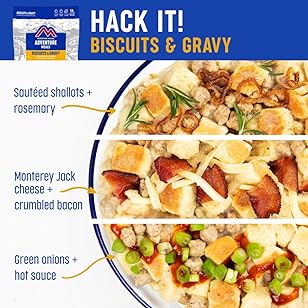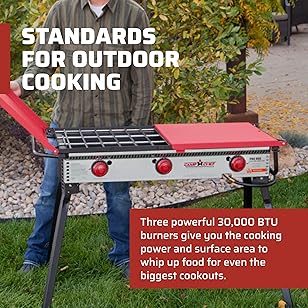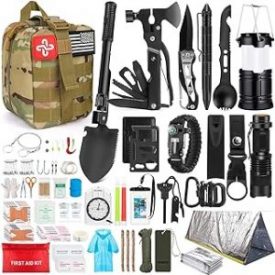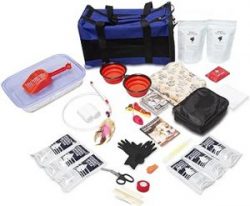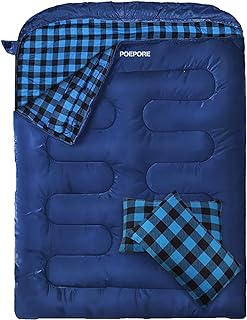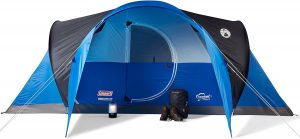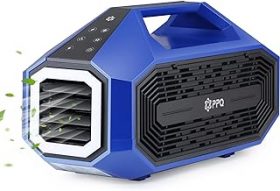Hurricane Survival
 A hurricane is essentially a large storm with high gusty winds, storm surges, and flooding that lasts up to two weeks or more. Usually, a hurricane will travel a path of open water that spans along the length of a coastal area, or seaboard.
A hurricane is essentially a large storm with high gusty winds, storm surges, and flooding that lasts up to two weeks or more. Usually, a hurricane will travel a path of open water that spans along the length of a coastal area, or seaboard.
A Hurricane in the Atlantic a Cyclone in the Indian ocean a Typhoon in the Pacific can be hundreds even a thousand miles across, strongest winds at the core or eye weakening to tropical storm strength at the outer edges.
If the eye passes over you, everything that the storm threw at you one way will come from the opposite direction as the storm moves on. The eye of the storm is a short period of calm time giving a few moments when something can be rescued or secured but move quickly as the eye rarely lasts more than half an hour and you do not want to be caught outside, not a time to let the kids and pets out.
If one storm side or the other passes over you, all the wind will come from one direction. Typically, the wind gusts so everything is shaken loose, if possible, sometimes small tornados form doing additional damage with their extra high winds. Hurricanes are drier than typical heavy rainstorms, but they can drive or push water against the shore and cause flooding that way.
Before a hurricane, you need to plan ways to secure your property. You can use plywood or aluminum panels to cover up your windows. Remember, masking or even duct tape does not keep your windows from breaking. Another option is what many sources refer to as “permanent storm shutters.”
When reroofing have the contractor bring the roof as much up to code as possible by installing hurricane straps to secure your roof to the structure of your home to prevent roof lifting damage (or keep it to a minimum) and hurricane clips that help secure the plywood sheets to each other. Next, you need to make sure that trees and shrubs near your home are trimmed to allow wind to pass through them, so we do not have trees falling on our home. Also make sure that the rain gutters and basement window wells are clear to help prevent any flooding.
We recommend constructing a safe room, or fitting out a basement, where you can stay away from the damage of the hurricane. Keep private and important documents in your basement, too. Bring in anything that can be carried away by the wind and hit anyone—so look for bicycles, furniture, umbrellas, and so on.
If no basement or safe room, predetermine the strongest room in the place, an interior room or room with the fewest smallest windows.
Onward to what you need to have during a hurricane. First, you need water, plan one gallon per person per day is what most experts agree on. Make sure you have to have at least three-day supply of nonperishable food in sealed containers. Make sure that you have a manual can opener with you as you never know if electricity will be available or not.
Another thing that you should make sure you have is several high-quality tactical flashlights (and battery powered florescent lantern) with fresh batteries. Sometimes, electricity is down after or during a hurricane, so flashlights will help you navigate your way around your safe room. Next, a battery-powered radio can help you figure out the weather, where to go, and so on.
Medication and first aid are both really crucial. Make sure you have at least 7-day supply for every person in the family. If anyone has hearing aids, make sure you bring extra batteries, glasses, contacts in a secure location, and so on. The aftermath of a hurricane’s destruction can last weeks with roads and stores closed and power waiting to be restored.
Personal hygiene is so important, too, to avoid infections or diseases. So, make sure you have enough sanitary items stored away. Any personal documents need to be stored too (passports, birth certificates, insurance policies, medication information in zip lock bags).
Finally, make sure you have practical things with you like a cell phone with its charger, contact information of emergency officials. Make sure you have extra cash, maps of the local area.
Remember that hurricanes will pass. Damaged as properties may become, remind yourself of the things that matter: your health and your family’s safety as well.
Assembling your hurricane survival package
If there is a hurricane coming to your area, it is important for you set up a survival package. The package needs to include certain things that can help you survive should you be stranded during the hurricane. Pre-assemble your emergency kit well in advance of any emergency. You may have to evacuate at a moment’s notice and take essentials with you. You will have limited time to search for the supplies you need or shop for them. Don’t expect local officials and relief workers to bring you supplies you are responsible for having in advance, they will be on the scene after a disaster, but they cannot help everyone if anyone. You could get help in hours, or it might take days or be redirected to people with greater need.
Surviving after a hurricane can be a dangerous proposition, which is why most experts recommend putting together a 72-hour survival kit for your family. If you have ever tried to assemble something like this all at once you may have discovered that it can take hours of shopping all over the map without everyone else trying to do the same at the same time.
Okay, so what do we need to plan for? First, we need water and food, especially a three-day supply of food that would not perish or it does not go bad. Make sure that you have batteries and a battery-powered radio. Hurricane aftermath poses a number of challenges you simply do not get from floods or earthquakes. One of the most important is that they tend to knock out the power almost immediately, leaving your family without essential heat or a way to preserve food. So, you also need a flashlight and extra batteries to keep your flashlight working.
It is of course crucial to have first aid kits on the ready in the sheltering place, car, among your supplies, to make sure you can take care of everyone if needed. Your first aid kit needs to contain all the essentials: band aids, bandages, scissors, sterile pads, gauze bandage, non-prescription medication and insect repellent. If one of your family members is under medication for a specific health problem, you want to keep a stock of prescription drugs in your kit as well. Most medical plans don’t allow you to have extra medication, speak to your doctor about getting a separate prescription filled to cover this need.
You need whistles, to signal for help. You also need a dust mask to help filter contaminated air and plastic sheeting and duct tape to seal storm caused openings in order to shelter in place. In order to stay sanitary, stock up on moist towelettes and garbage bags. You will also need your normal personal hygiene items such as soap, toothbrush, shampoo, toothpaste and deodorant among others.
Do a wash prior to the hurricane, having clean dry clothes to change into can really improve your mood after a day of cleanup.
You need canned food, remember, so make sure you have a can opener, a manual one, since electricity may be out.
You may also need a simple tool set, pliers to turn off water and gas utilities that may become uncontrolled, turn off breakers so you don’t have an electric surge of power or any power issues.
Essential hurricane survival supplies list
There are a number of items that are essential in a survival supplies list from hurricanes. First and foremost, it is important to have water, lots of it, to stay hydrated. Make sure you should keep one gallon per person per day (a three-day supply). You also need food. So, you need a three-day supply of nonperishable food.
Do not forget cooking tools that do not rely on electricity and a manual can opener (that would suck, to have all these cans and nothing to open them with). Paper plates, paper utensils, plastic or paper cups. Make sure you have lots of trash bags and duct tape, both of which can help seal your home and hold garbage.
Then, you need to make sure you have a flashlight for each person, batteries for these flashlights, too. Also, make sure you have a radio that works on batteries. That way, you can hear where shelters are. Keep your medications extra, tools that have multi-purposes are also handy.
Another crucial aspect of hurricane survival is sanitation. The sanitation of each person is really important. So, keep hygiene as a priority and keep hygienic items with you for each family member. Next, you need to keep copies of all personal documents so that they do not get lost behind.
A charged cell phone can mean the difference between life and death in a hurricane situation. Even if reception may become spotty, you still may need to call for help, keep in touch with loved ones, and stay up to date on what is happening outside of your home. Keep extra cash to keep you safe, in case you need to buy anything that will keep you safe.
Make sure that if you need maps of the area, they are in order to find your way around the town to find refuge. In addition, supplies for your babies and pets are important to have in excess. Also, any tools you have to support your home and secure it are essential. So, maybe some duct tape, cardboard, trash bags, mylar blankets, plywood, anything that can keep you dry. Make sure you have all your extras: extra keys to your car, to your house, extra clothing, particularly rain gear.
Experts also recommend you take pictures of the damage before you begin cleanup, in case you need anything to show the extent of it to an insurance company and so on.
Whatever happens, remember that you and your family have to be strong for each other, children and pets take their clues from us, if we appear afraid and nervous, they will be too, and that is the biggest and most important essential hurricane survival supply you can have or ask for. Help others if you can. Seek shelter if your home is in a dangerous area, and stay in touch with your family, listen to the news. Stay as strong and as brave as you can be.
There are other things that are very important to remember storing. Do not forget pillows, blankets, flashlights and batteries. Remember that electricity may be gone for a while, so you need your basic necessities fulfilled: food, sleep, hygiene. Clothing is another thing you should consider packing during a hurricane. Make sure that it is appropriate clothing for the weather, so it needs to be cozy, rain repellent, sturdy, and warm.
Speaking of hygiene is really important when it comes to survival tools. You must make sure you have first aid kits ready with medicine, prescription drugs, bandages, and rubbing alcohol. You also should consider have moisture wipes, toiletries and hygienic items stored away, too. Waterless soap is a fantastic idea to invest in. The same idea applies to dry shampoo (that stuff is amazing!). Another aspect of hygiene is protection from bugs, so make sure you have bug spray, and sunscreen.
Finally: it is so crucial to keep your children occupied with books, toys. This can be a way of connecting as a family, so bring in some board games. Try to make the best of this situation. Get to bond with the family, take a look at your important documents, laugh at how silly serious you look in your passport, smile because you have the people who matter most in the world with you (hopefully!) and that this too shall pass, somehow, without much damage, hopefully.
Necessary hurricane survival tips
There are quite a few things to keep in mind when facing a hurricane, or a potential one. First, you have to prepare your home. Come up with a plan of who will get what in case of a hurricane. Rehearse the plan so that it comes naturally to you and your family.
Next, trim trees and bushes before hurricane season so that the wind does not blow them on your home or cars. Bring in patio furniture, plants, television antennae, and inspect your roof for any debris already there that needs to be fixed before the hurricane so there is no further damage, or the damage is not as bad.
Afterwards, you have to figure out if you need to evacuate or not. Either way, you need to be prepared and packed up. Make sure every person has two to three gallons of water, prescription medications, and first aid kits. A flashlight with batteries is really important as electricity may be out. A battery powered radio is also a must because it helps you stay alert and aware of where the hurricane is heading and how dangerous it is.
Your cell phone will be your best friend in preparation for hurricane season. Make sure you have every loved one’s phone number and keep in touch as much as you can. Bring the phone’s charger, just in case there is electricity, and you can recharge the phone.
Having camping supplies can be a great help in preparing food and temporary shelter. A gas BBQ with an extra tank or two can help you use up that fast-defrosting food. If storms and power outages come your way often, consider a generator.
Another important thing you must do is navigate your way through the city, so a map would be so helpful. Do not just download Mapquest or any online maps, since your phone may die on you.
Keep in mind all emergency information applies. Electric lines may be down and still be live or come alive without notice, never step in water a line may be down in. High objects like signs may fall at any moment, sink holes may open up, water may not be safe to drink from usually safe sources.
Having cash with you, for hotels, food, gas, vending machines, is also a good idea. It can help you maneuver your way through the city. Also keep important documents with you: your license, passport, social security card, taxes, certificates of marriage, birth, and death, insurance information and so on).
Sleeping bags are good to take with you. You never know when you may need them. You may not end up spending the night in your bed for a few days, so a sleeping bag can be a good option at a shelter.
And finally, this is something you cannot pack for, really. I mean, we can list things you can do to prepare for it. But ultimately, hurricanes are scary storms that scar a lot of people, sometimes literally. So, be vigilant, be alert, be helpful as much as you can. If there is a time to put your best foot forward, this is really it. This is the time to offer help to others, extend warmth and support to those who may need it. Stay strong!
Some Frank Talk
As we always say, the best way to avoid a disaster is not to be there in the first place. Hurricanes tend to roll along the coastline, so don’t run ahead of the hurricane, it will follow you.
Mandatory evacuation does not mean you must leave, only that you should if possible. They can not make you leave unless you appear to be demented in which case, they can make the determination for your own good. Keep in mind if you elect to stay there will be no assistance available where no one is supposed to be.
Pets: They keep announcing there are places for your pets, there are not. Well maybe for a teacup poodle with all the cancer-causing shots recorded, and you have prearranged with carrier cage and food, etc. If you have six hound dogs or twenty cats, there will be no place for you, which is why many people shelter in place.
Look for a good buy on a battery powered ac/dc tv as the old ones no longer work, the new ones use a lot of power as does streaming on the cell phone so have spare batteries, same for the laptop, have a secondary service or dialup for backup as land line phones may work even when power is down.
Candles, buy the ones in jars as they are safer than open flames, put them well out of reach of pets, children, demented adults and flammable objects.
If you have a generator, get a camping one, not one for contractors that runs flat out and loud. Have a darn good lock and cable because you want it away from the house, yet secure from thieves. If the generator suddenly stops, it may be in the process of being stolen so check immediately. Do not pour gas into a hot generator, let it rest and cool a bit. You can not run a generator or BBQ in the house, outside always please.
If the roof starts to come off and there is nowhere else to go, get into a corner and pull a mattress over yourself for some protection from flying objects.
Most disasters require pretty much the same prep to be prepared, so have any one disaster well covered you are ready for most from avalanches to zombies.
_


 August 31, 2016
August 31, 2016 
